Politics’ regular season has begun once again. We’ve been watching the training camp stuff all summer, and now it’s time to play for the money, I guess. I’m not great with sports analogies, so that’s as far as  I’ll go. No, wait – I lied… President Obama had the opening pitch on Wednesday night (okay, that’s really it) and I’d say he did a pretty decent job of explaining what it is he wants to do. It doesn’t exactly comport with what I think needs to happen to bring the United States to a place where we behave like a civilized modern industrial nation, but it’s a bit clearer than it’s been up to now. While my inclination is to support this – particularly if it includes the so-called “public option” – I am a bit concerned about what this will mean for people who have no coverage at all, or just the sort of lousy coverage I used to carry years ago. I’d like to hear more about that interim period during which the uninsured receive “basic” health insurance. That seems a bit problematic, to say the least, in that it sounds like it would insure people who are more prone to illness (i.e. poor families) in the least effective and most expensive way available.
I’ll go. No, wait – I lied… President Obama had the opening pitch on Wednesday night (okay, that’s really it) and I’d say he did a pretty decent job of explaining what it is he wants to do. It doesn’t exactly comport with what I think needs to happen to bring the United States to a place where we behave like a civilized modern industrial nation, but it’s a bit clearer than it’s been up to now. While my inclination is to support this – particularly if it includes the so-called “public option” – I am a bit concerned about what this will mean for people who have no coverage at all, or just the sort of lousy coverage I used to carry years ago. I’d like to hear more about that interim period during which the uninsured receive “basic” health insurance. That seems a bit problematic, to say the least, in that it sounds like it would insure people who are more prone to illness (i.e. poor families) in the least effective and most expensive way available.
I’m here to tell you, I have had catastrophic policies before. I have also had standard individual indemnity policies. They pay for nothing. As long as you are healthy and lucky enough to remain out of the hospital, you will see not one dime out of these plans. They have enormous deductibles and don’t pay for any preventive care. From the insurer’s standpoint, that’s a great deal, if the insured doesn’t get badly ill. But if you end up in the hospital, they’re on the hook for some major medical costs – that’s why they tend to cap your benefits… to ensure that you don’t get too expensive in the throes of your misfortune. My first plan ever was a Mutual Of Omaha policy (actually, several policies) that worked like this – if you had a partially reimbursable expense (I never actually did, but it was theoretically possible), you pay for the care and they would send you a check…. eventually… maybe. It was kind of iffy, to say the least, and definitely set up to keep the money flowing in one direction – from you to Omaha.
The funny thing was, they were in the process of discontinuing this class of policy, presumably because it was not profitable. I’m not surprised, frankly. Any policy that encourages you to ignore your illnesses for as long as possible, to not receive any diagnostic care or testing, to avoid contact with health  professionals who might actually help steer you in a positive direction (i.e. eat better, don’t smoke, etc.), is not going to have particularly good outcomes. People are going to get badly sick, discover illnesses at later stages (when treatment tends to be most expensive), and ultimately cost more than those who receive strong preventive care. That, I think, is one of the traps the Obama health plan might fall into – offering minimal care to people who can’t afford better, even though that approach eventually costs more (and creates greater misery in the process). What the hell, we are the wealthiest, most powerful nation on Earth. It’s a scandal that almost 50 million people have no health coverage. We need to make certain people get the right kind of care, because it’s the right thing to do. Oh, and it will save money besides.
professionals who might actually help steer you in a positive direction (i.e. eat better, don’t smoke, etc.), is not going to have particularly good outcomes. People are going to get badly sick, discover illnesses at later stages (when treatment tends to be most expensive), and ultimately cost more than those who receive strong preventive care. That, I think, is one of the traps the Obama health plan might fall into – offering minimal care to people who can’t afford better, even though that approach eventually costs more (and creates greater misery in the process). What the hell, we are the wealthiest, most powerful nation on Earth. It’s a scandal that almost 50 million people have no health coverage. We need to make certain people get the right kind of care, because it’s the right thing to do. Oh, and it will save money besides.
So, hey… here’s an avid single-payer advocate saying, let’s encourage our legislators and our president to pass a bill that will help those most in need. Let’s put that stake in the ground – then we can start working on putting a stake through the heart of this ludicrous privatized health insurance scam we call a “system”.
luv u,
jp

 to gain a couple of (or, more likely, just one) Republican vote(s) in the Senate – votes that would probably be superfluous without the public option anyway. At this moment, I’m hoping this was just a trial balloon put up by an increasingly pusillanimous White House, but my common sense tells me that’s not the case. The public plan was the ten-day-old soup bone tossed to the left in exchange for their acquiescence to the administration’s decision not to even discuss adopting a single payer system; so, of course, the triangulators we’ve put in charge of our government consider this expendable, just as they consider progressives a block of votes they can take for granted. Stupid move, if true. The public option is all that’s left of meaningful health insurance reform. Without that, we might as well not bother. The balance of the legislation will essentially require everyone to buy private insurance, with subsidies for those who cannot afford it, and that mandate would only benefit big fat private insurers. In fact, it would set things up so that whether the legislation passes or not, they would stand to win.
to gain a couple of (or, more likely, just one) Republican vote(s) in the Senate – votes that would probably be superfluous without the public option anyway. At this moment, I’m hoping this was just a trial balloon put up by an increasingly pusillanimous White House, but my common sense tells me that’s not the case. The public plan was the ten-day-old soup bone tossed to the left in exchange for their acquiescence to the administration’s decision not to even discuss adopting a single payer system; so, of course, the triangulators we’ve put in charge of our government consider this expendable, just as they consider progressives a block of votes they can take for granted. Stupid move, if true. The public option is all that’s left of meaningful health insurance reform. Without that, we might as well not bother. The balance of the legislation will essentially require everyone to buy private insurance, with subsidies for those who cannot afford it, and that mandate would only benefit big fat private insurers. In fact, it would set things up so that whether the legislation passes or not, they would stand to win.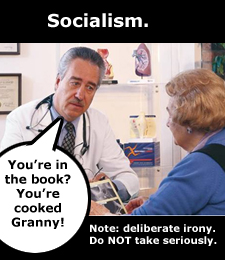 of why a national health insurance plan would tend not only provide better coverage, but actually save money… and lots of it. This is often framed as an effort to “socialize” the health care industry by having the government – and the taxpayers – pay to cover the uninsured, who are more often than not portrayed as a.) lazy, b.) irresponsible, and/or 3.) selfish – a kind of “hand out”, if you will. Here’s the part that, frankly, makes us look dumb: the government (and taxpayers) already insure the most expensive people in the country to insure, namely the elderly (Medicare) and the poor (Medicaid, S-CHIP). Extending, say, Medicare to cover everyone, including young, healthy workers, would make the system better able to pay for itself and provide better care. How good is Medicare, really? Ask mom or grandma… if she’s not too scared to talk to you because Glen Beck told her you may be a socialist.
of why a national health insurance plan would tend not only provide better coverage, but actually save money… and lots of it. This is often framed as an effort to “socialize” the health care industry by having the government – and the taxpayers – pay to cover the uninsured, who are more often than not portrayed as a.) lazy, b.) irresponsible, and/or 3.) selfish – a kind of “hand out”, if you will. Here’s the part that, frankly, makes us look dumb: the government (and taxpayers) already insure the most expensive people in the country to insure, namely the elderly (Medicare) and the poor (Medicaid, S-CHIP). Extending, say, Medicare to cover everyone, including young, healthy workers, would make the system better able to pay for itself and provide better care. How good is Medicare, really? Ask mom or grandma… if she’s not too scared to talk to you because Glen Beck told her you may be a socialist.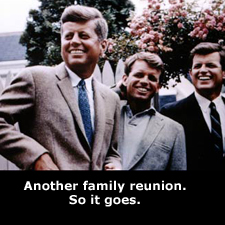 politics tends to focus the mind, particularly during times of upheaval and uncertainty, which 1980 most certainly was. My late brother Mark, who passed away late that same year, took a keen interest in the campaign – he’d been a strong Kennedy supporter from his youngest days and particularly so with Robert Kennedy’s 1968 run for the Democratic presidential nomination. Mark, Matt (my Big Green compatriot) and I supported the younger Kennedy against Carter for many of the same reasons I have had for backing the more left-leaning candidates in that party since working on the McGovern campaign as a pre-teenager. But there was also that Kennedy symbolism, the notion that they represented in the minds of so many a kind of liberal ideal and inside-the-system activism strong enough to attract people who might otherwise take their place on the barricades. As far to the left as we were, we could always manage to give a Kennedy the benefit of the doubt.
politics tends to focus the mind, particularly during times of upheaval and uncertainty, which 1980 most certainly was. My late brother Mark, who passed away late that same year, took a keen interest in the campaign – he’d been a strong Kennedy supporter from his youngest days and particularly so with Robert Kennedy’s 1968 run for the Democratic presidential nomination. Mark, Matt (my Big Green compatriot) and I supported the younger Kennedy against Carter for many of the same reasons I have had for backing the more left-leaning candidates in that party since working on the McGovern campaign as a pre-teenager. But there was also that Kennedy symbolism, the notion that they represented in the minds of so many a kind of liberal ideal and inside-the-system activism strong enough to attract people who might otherwise take their place on the barricades. As far to the left as we were, we could always manage to give a Kennedy the benefit of the doubt.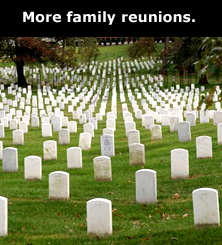 which put him ahead of nearly every political figure who took the podium to eulogize him at his memorial celebration in Boston’s JFK Library. In that way, and in a number of different ways over the course of his 47 years in the Senate, he amassed a record of accomplishment that makes him the head of his family, in my book. Yes, it’s a flawed legacy, one that reflects positions with which I disagree, but he took that Kennedy myth and made it into something tangible. That in itself is worth remembering. Sadly, his best efforts and ours thus far have not been sufficient to save the lives of the more than forty American service people who’ve died in Afghanistan this month alone.
which put him ahead of nearly every political figure who took the podium to eulogize him at his memorial celebration in Boston’s JFK Library. In that way, and in a number of different ways over the course of his 47 years in the Senate, he amassed a record of accomplishment that makes him the head of his family, in my book. Yes, it’s a flawed legacy, one that reflects positions with which I disagree, but he took that Kennedy myth and made it into something tangible. That in itself is worth remembering. Sadly, his best efforts and ours thus far have not been sufficient to save the lives of the more than forty American service people who’ve died in Afghanistan this month alone.  family. If it does, they should dedicate a bridge to every one of the more than 4,300 sacrificed needlessly in that seemingly endless war. I doubt we have enough bridges to name for all the Iraqis who’ve died as a result of the 2003 invasion. (I don’t know – are there a million bridges in America?) Whenever I hear about these dedications, monuments, memorials to war dead, I can’t help but think of that eulogy Marc Antony delivered in Julius Caesar: “I come not to praise Caesar, but to bury him.” We always hear about how they died “protecting our freedoms,” when really they died because of our ignorance as a nation and our inability to stop this travesty from happening.
family. If it does, they should dedicate a bridge to every one of the more than 4,300 sacrificed needlessly in that seemingly endless war. I doubt we have enough bridges to name for all the Iraqis who’ve died as a result of the 2003 invasion. (I don’t know – are there a million bridges in America?) Whenever I hear about these dedications, monuments, memorials to war dead, I can’t help but think of that eulogy Marc Antony delivered in Julius Caesar: “I come not to praise Caesar, but to bury him.” We always hear about how they died “protecting our freedoms,” when really they died because of our ignorance as a nation and our inability to stop this travesty from happening. congressman’s office, or we shake our head at the news, but without the prospect of conscription threatening ourselves and/or our children, there will be no fire in the belly. That is something our political class and our military have long since worked out. They’ve long since adopted the imperial formula for endless war – a foreign legion made up of volunteers, supplemented by mercenaries. And they name bridges after those sacrificed on the alter of our stupidity. So perhaps we need a different kind of monument, one dedicated to those persistent killers that live within us: ignorance and apathy. That’s it – dedicate a bridge to our own foolishness. Or chisel Dubya’s face into Rushmore so that we’ll remember who talked us into this travesty. Anything to memorialize the historic, disastrous mistake we’ve made, so that there’s some small chance we won’t repeat it.
congressman’s office, or we shake our head at the news, but without the prospect of conscription threatening ourselves and/or our children, there will be no fire in the belly. That is something our political class and our military have long since worked out. They’ve long since adopted the imperial formula for endless war – a foreign legion made up of volunteers, supplemented by mercenaries. And they name bridges after those sacrificed on the alter of our stupidity. So perhaps we need a different kind of monument, one dedicated to those persistent killers that live within us: ignorance and apathy. That’s it – dedicate a bridge to our own foolishness. Or chisel Dubya’s face into Rushmore so that we’ll remember who talked us into this travesty. Anything to memorialize the historic, disastrous mistake we’ve made, so that there’s some small chance we won’t repeat it.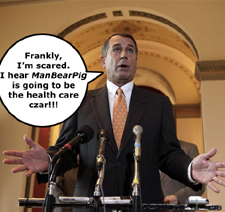 things you do is fill out paperwork designating a health care proxy, establishing medical directives (i.e. resuscitate or not), and so on. Basically routine stuff that the hospital needs to know when a loved one is receiving care and may not be able to speak for him/her self at a crucial juncture. Pretty scary, eh? What…. aren’t you scared of that? Because that’s what Sara Palin (a.k.a. the Wassila brain trust), John Boehner (pronounced “boner”), Chuck Grassley (a.k.a. his own grandmother), Newt Gingrich (a.k.a. Captain Yesteryear) and others are trying to make you afraid of: a routine consultation that proposed health care legislation might end up providing coverage for. Not some new federal power to cull the herd. Just funding for the kind of meeting people have with their doctors all the freaking time. Be afraid!
things you do is fill out paperwork designating a health care proxy, establishing medical directives (i.e. resuscitate or not), and so on. Basically routine stuff that the hospital needs to know when a loved one is receiving care and may not be able to speak for him/her self at a crucial juncture. Pretty scary, eh? What…. aren’t you scared of that? Because that’s what Sara Palin (a.k.a. the Wassila brain trust), John Boehner (pronounced “boner”), Chuck Grassley (a.k.a. his own grandmother), Newt Gingrich (a.k.a. Captain Yesteryear) and others are trying to make you afraid of: a routine consultation that proposed health care legislation might end up providing coverage for. Not some new federal power to cull the herd. Just funding for the kind of meeting people have with their doctors all the freaking time. Be afraid! When I see the air time allotted to the immensely ill-informed protesters at various Congressional town hall meetings, I feel grateful that we live in a nation that allows a voice to dissent… until I recall that, in the run-up to both the Afghan and the Iraq wars, very very few voices of articulate dissent were allowed on the airwaves, and almost as few have been heard from since… even though, in the case of Iraq particularly, the claims of the anti-war movement have been borne out to an extent that no one would have thought possible six years ago. Seems that only those dissenters who are aligned with major corporate interests can expect to be heard from loudly and clearly. Not that they seem all that appreciative. Hell, here they are at a public forum that allows private citizens to comment, participate, and even debate political leaders, and they act as though they’re being squelched, even though they are, in fact, squelching the opinions of those who disagree with them.
When I see the air time allotted to the immensely ill-informed protesters at various Congressional town hall meetings, I feel grateful that we live in a nation that allows a voice to dissent… until I recall that, in the run-up to both the Afghan and the Iraq wars, very very few voices of articulate dissent were allowed on the airwaves, and almost as few have been heard from since… even though, in the case of Iraq particularly, the claims of the anti-war movement have been borne out to an extent that no one would have thought possible six years ago. Seems that only those dissenters who are aligned with major corporate interests can expect to be heard from loudly and clearly. Not that they seem all that appreciative. Hell, here they are at a public forum that allows private citizens to comment, participate, and even debate political leaders, and they act as though they’re being squelched, even though they are, in fact, squelching the opinions of those who disagree with them.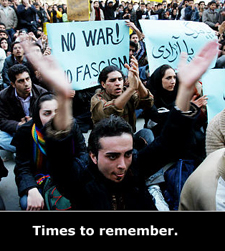 own small community who have given far more to the causes they believe in, and I respect them for it. Just as I respect pacifism, as someone who (while no fan of violence) is not a committed pacifist. It does my heart good to see those large numbers of protesters in the streets in Iran. This is a huge moment for them, one that many of the younger people among them, particularly, will never forget. Though the mainstream political and media pundits would probably disparage this connection, it’s something like the massive anti-war actions of the late 1960s and early 1970s, which of course our popular culture has shrunken down to something akin to a flower-power postage stamp. (Just as it has reduced the civil rights movement to Martin King saying “I have a dream.”)
own small community who have given far more to the causes they believe in, and I respect them for it. Just as I respect pacifism, as someone who (while no fan of violence) is not a committed pacifist. It does my heart good to see those large numbers of protesters in the streets in Iran. This is a huge moment for them, one that many of the younger people among them, particularly, will never forget. Though the mainstream political and media pundits would probably disparage this connection, it’s something like the massive anti-war actions of the late 1960s and early 1970s, which of course our popular culture has shrunken down to something akin to a flower-power postage stamp. (Just as it has reduced the civil rights movement to Martin King saying “I have a dream.”)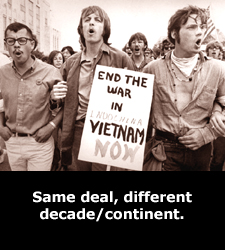 (e.g. Obama is going to force people to accept “death counseling” – be afraid!) with the anti-Iraq war movement that pegged the drive towards war largely on the influence of neoconservatives formerly associated with the Project for a New American Century, which, in fact, led the drive for war and regime change in Iraq starting in the Clinton Administration. Now, I’d say that is a little bit too fact-based to qualify as a conspiracy theory on the order of, say, Obama’s mandatory death counseling. The fact that the neoconservatives associated with PNAC were not the only ones in favor of the Iraq war doesn’t exactly absolve them of all responsibility. But the flaw in Brook’s comparison goes deeper than that. The pre-emptive movement against the War in Iraq was a massive, organic, global phenomenon that grew in the near-total absence of any articulate anti-war opinion in the mainstream media during 2001-2003. These crackhead gatherings at town hall meetings (including one in my own town led by some idiot from Rome who later went on the even more profoundly idiotic Glen Beck’s show) are not anything like a mass movement organized around a coherent goal. They’re just disparate groups of disgruntled conservatives shouting about having been out of power for six whole months.
(e.g. Obama is going to force people to accept “death counseling” – be afraid!) with the anti-Iraq war movement that pegged the drive towards war largely on the influence of neoconservatives formerly associated with the Project for a New American Century, which, in fact, led the drive for war and regime change in Iraq starting in the Clinton Administration. Now, I’d say that is a little bit too fact-based to qualify as a conspiracy theory on the order of, say, Obama’s mandatory death counseling. The fact that the neoconservatives associated with PNAC were not the only ones in favor of the Iraq war doesn’t exactly absolve them of all responsibility. But the flaw in Brook’s comparison goes deeper than that. The pre-emptive movement against the War in Iraq was a massive, organic, global phenomenon that grew in the near-total absence of any articulate anti-war opinion in the mainstream media during 2001-2003. These crackhead gatherings at town hall meetings (including one in my own town led by some idiot from Rome who later went on the even more profoundly idiotic Glen Beck’s show) are not anything like a mass movement organized around a coherent goal. They’re just disparate groups of disgruntled conservatives shouting about having been out of power for six whole months. Beer at the ‘House. Like you, I saw the photo of the president and vice president sitting down with Henry Louis Gates, Jr., and Sgt. James Crowley. Looked friendly enough, as intended. For me, though, it doesn’t erase that disturbing image of Gates being led out of his house in handcuffs – a man who walks with a freaking cane – in obvious distress. Whoever made the decision to subject Harvard’s Alphonse Fletcher University Professor and the Director of the W.E.B. DuBois Institute to this level of humiliation is, well, let’s say not a nice man. I don’t care what Gates said to the police in his own home. If he didn’t wave a gun at them or try to assault them in some way, there was no reason to arrest him. They were responding to a non-existent crime. They could have just left the scene. They chose otherwise.
Beer at the ‘House. Like you, I saw the photo of the president and vice president sitting down with Henry Louis Gates, Jr., and Sgt. James Crowley. Looked friendly enough, as intended. For me, though, it doesn’t erase that disturbing image of Gates being led out of his house in handcuffs – a man who walks with a freaking cane – in obvious distress. Whoever made the decision to subject Harvard’s Alphonse Fletcher University Professor and the Director of the W.E.B. DuBois Institute to this level of humiliation is, well, let’s say not a nice man. I don’t care what Gates said to the police in his own home. If he didn’t wave a gun at them or try to assault them in some way, there was no reason to arrest him. They were responding to a non-existent crime. They could have just left the scene. They chose otherwise. Isn’t this kind of rewarding stupidity and selfishness? Again – I think they should extend the program, and I see the point of it. But w.t.f., you feds – share the love a little bit. Shouldn’t folks who bought more modest vehicles – who are just as crunched as any suburban truck-drivers – get some help too?
Isn’t this kind of rewarding stupidity and selfishness? Again – I think they should extend the program, and I see the point of it. But w.t.f., you feds – share the love a little bit. Shouldn’t folks who bought more modest vehicles – who are just as crunched as any suburban truck-drivers – get some help too?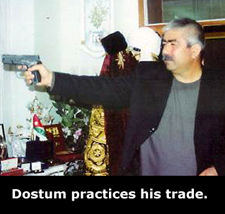 Esq. There are, of course, the ongoing wars of choice in Iraq and Afghanistan, with much of the attention focused on the U.S. soldier captured by an Afghan Taliban group. I did hear other news of the Afghan conflict this week – the
Esq. There are, of course, the ongoing wars of choice in Iraq and Afghanistan, with much of the attention focused on the U.S. soldier captured by an Afghan Taliban group. I did hear other news of the Afghan conflict this week – the  refusing to officially acknowledge the presence of hundreds of Israeli nukes (a largely useless arsenal that will continue to prompt nuclear proliferation efforts in the Middle East). She and the administration have been making relatively encouraging noises on the Honduran coup, calling for the return of President Zelaya, but it seems to be having little effect. Unfortunately, the Honduran military is an institution designed not for national defense, but for “internal security” (i.e. keeping the peasants and workers in line), much like the many other militaries we helped foster in that region. Once you teach the little dog to bite, he may continue to do it, even if doggy daddy no longer wants him to.
refusing to officially acknowledge the presence of hundreds of Israeli nukes (a largely useless arsenal that will continue to prompt nuclear proliferation efforts in the Middle East). She and the administration have been making relatively encouraging noises on the Honduran coup, calling for the return of President Zelaya, but it seems to be having little effect. Unfortunately, the Honduran military is an institution designed not for national defense, but for “internal security” (i.e. keeping the peasants and workers in line), much like the many other militaries we helped foster in that region. Once you teach the little dog to bite, he may continue to do it, even if doggy daddy no longer wants him to. insurance. In America, it really takes a major illness to know whether or not you have what could be termed adequate coverage (and if you’re one of the 47 million who have no insurance at all, the question doesn’t even arise). But the utter failure of this system shows up in the little details as well. Not to bore you with my personal foibles, but for the last five or so years I’ve had dental insurance… which means, in my case, if I have any substantial work done – crowns, for instance – I can expect to pay $1,000 out of pocket instead of $1,600 (assuming it happens no more than once a year). Don’t know about you, but that grand is a little hard to put my hands on, so I tend to throw it on the old credit card and whittle it down month by month. That, in miniature, is one illustration of how people can get into serious financial trouble simply by being unfortunate enough to get sick or injured.
insurance. In America, it really takes a major illness to know whether or not you have what could be termed adequate coverage (and if you’re one of the 47 million who have no insurance at all, the question doesn’t even arise). But the utter failure of this system shows up in the little details as well. Not to bore you with my personal foibles, but for the last five or so years I’ve had dental insurance… which means, in my case, if I have any substantial work done – crowns, for instance – I can expect to pay $1,000 out of pocket instead of $1,600 (assuming it happens no more than once a year). Don’t know about you, but that grand is a little hard to put my hands on, so I tend to throw it on the old credit card and whittle it down month by month. That, in miniature, is one illustration of how people can get into serious financial trouble simply by being unfortunate enough to get sick or injured.  of “lemon socialism”; privatize the profitable part of a business and socialize the costly part. The government provides coverage for the elderly, the poor, the infirm, etc. … all of the folks who require more care. That leaves the rest of us to the marketplace, where these massive private health insurance companies can decide who to cover, whose bills to pay, etc. Young and middle aged workers tend to pay in more than they take out of health insurance – by leaving them out of the government system, we create a situation where that system will inevitably run massive deficits over time. If we all participated in the same system, the healthy would compensate for the chronically ill, the elderly, etc. That’s the way it works in other industrialized countries – it could work here.
of “lemon socialism”; privatize the profitable part of a business and socialize the costly part. The government provides coverage for the elderly, the poor, the infirm, etc. … all of the folks who require more care. That leaves the rest of us to the marketplace, where these massive private health insurance companies can decide who to cover, whose bills to pay, etc. Young and middle aged workers tend to pay in more than they take out of health insurance – by leaving them out of the government system, we create a situation where that system will inevitably run massive deficits over time. If we all participated in the same system, the healthy would compensate for the chronically ill, the elderly, etc. That’s the way it works in other industrialized countries – it could work here. The Times of London quotes a U.S. commander as describing this action in terms of a “D-Day Moment”, but in the context of a conflict that has lasted nearly twice as long as America’s part in World War II, this would seem in relative terms more like a second. Also, rather than attacking the flank of the most powerful military force in the world, we are invading a battered, impoverished region of one of the planet’s most miserable nations – a place where people struggle to subsist, and where large-scale conflict will likely result in a major displacement of the population, perhaps approaching the scale of what is now occurring across the border in Pakistan’s tribal departments.
The Times of London quotes a U.S. commander as describing this action in terms of a “D-Day Moment”, but in the context of a conflict that has lasted nearly twice as long as America’s part in World War II, this would seem in relative terms more like a second. Also, rather than attacking the flank of the most powerful military force in the world, we are invading a battered, impoverished region of one of the planet’s most miserable nations – a place where people struggle to subsist, and where large-scale conflict will likely result in a major displacement of the population, perhaps approaching the scale of what is now occurring across the border in Pakistan’s tribal departments. WAR TAX LEVIES. Our system has corrected for this oversight, which proved the undoing of our last major imperial enterprise – the Indochina wars. By eliminating these two age-old institutional pillars of warfare, we have effectively disconnected the bulk of our population from the costs of warfare. Fueled by borrowed treasure and the victims of economic misfortune, our wars have become self-perpetuating. Afghanistan and Iraq are going to be a great deal harder to stop than was Vietnam (and it was hard to stop the Vietnam war, with the end coming far too late for the people of Vietnam, Cambodia, and Laos). This flurry of recent fighting is just another flare up in what has proven a far longer, more difficult campaign than anyone thought going in. The real D-Day question is, when will our V-E day arrive?
WAR TAX LEVIES. Our system has corrected for this oversight, which proved the undoing of our last major imperial enterprise – the Indochina wars. By eliminating these two age-old institutional pillars of warfare, we have effectively disconnected the bulk of our population from the costs of warfare. Fueled by borrowed treasure and the victims of economic misfortune, our wars have become self-perpetuating. Afghanistan and Iraq are going to be a great deal harder to stop than was Vietnam (and it was hard to stop the Vietnam war, with the end coming far too late for the people of Vietnam, Cambodia, and Laos). This flurry of recent fighting is just another flare up in what has proven a far longer, more difficult campaign than anyone thought going in. The real D-Day question is, when will our V-E day arrive?